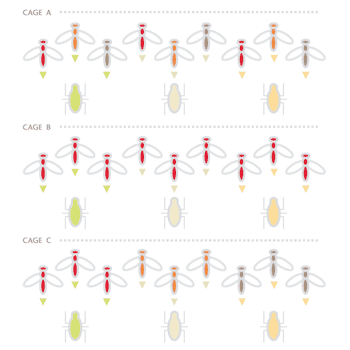Niche partitioning increases resource exploitation by diverse communities

WSM STAFF ILLUSTRATION
Three species of wasp that each preyed on all three kinds of aphids (Cage A) killed about the same number of aphids as a single species of wasp that could attack all three aphids (Cage B). Three species of wasp killed twice as many aphids as a single species when each kind of wasp preyed on a different kind of aphid (Cage C).
When it comes to biodiversity, the ecological roles filled by species matter more than the number of species in the system.
Diversity is beneficial because at some point as you’re adding more species, you’re adding species that do different things. It’s not biodiversity [the number of species per se] that need to be preserved, so much as it is species that do different things, according to researcher William Snyder.
In addition to answering an important ecological question, this study provides empirical support for sustainable agriculture practices and offered guidance on how best to do biological control of agricultural pests. The research appeared in the September 12, 2008 issue of Science magazine.
Snyder and Finke found that increasing the number of wasp species on a test plot increased resource use—consumption of aphids—only if each wasp species targeted a different kind of aphid.
The experiment is the first unambiguous demonstration of “niche partitioning,” the notion that multiple species can live in the same area only if they don’t compete for the same resources. The idea that niche partitioning is essential for biodiversity has been amply supported by mathematical models, but has not been definitively shown in experiments before this study.
The findings show that for efficient biological control of pests, the best recipe is to use multiple biocontrol agents that don’t have overlapping prey preferences. They also suggest why sustainable agricultural systems have relatively few pest problems despite their minimal use of pesticides.


Photo of William Snyder by Robert Hubner.
Deborah Finke, courtesy same.
William Snyder, Ph.D. :: Department of Entomology at the College of Agricultural, Human, and Natural Resource Sciences :: Areas of interest include the relationship between biodiversity and biological control; community ecology; predator-prey interactions; sustainable agriculture.
Deborah Finke, Ph.D. :: Division of Plant Sciences with the College of Agriculture, Food and Natural Resources at the University of Missouri. Deborah was a post-doctoral researcher working with Snyder.
